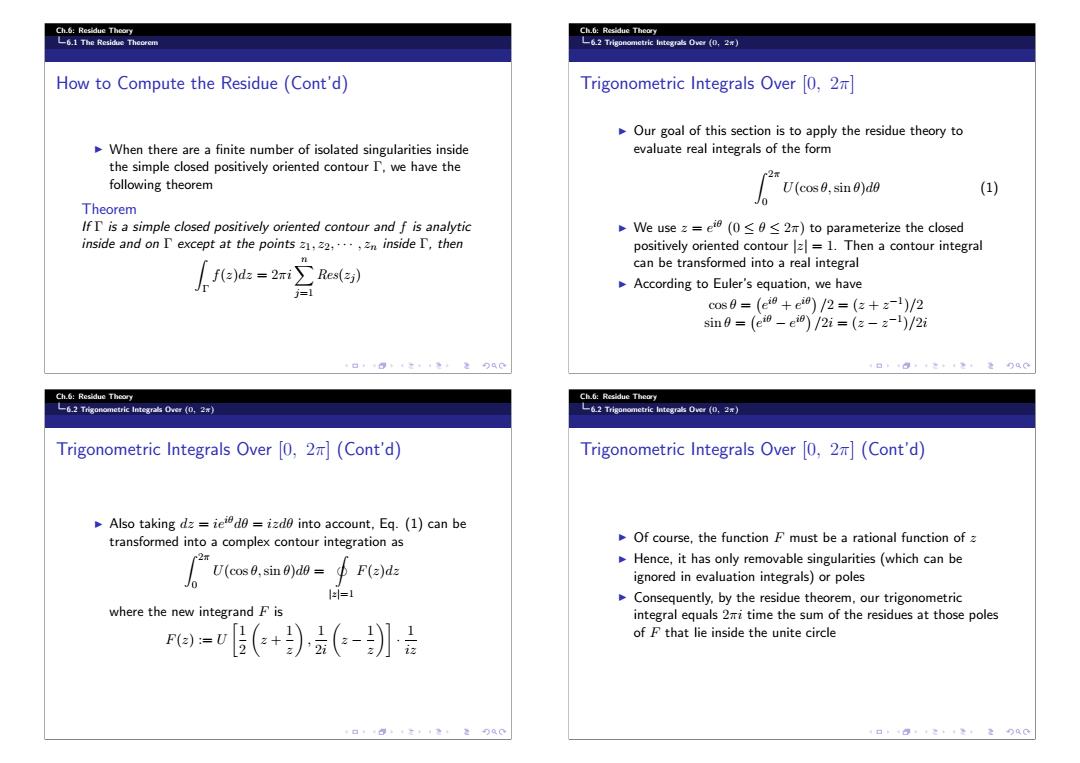正在加载图片...

Ch.6:Residue Thoory Ch.6:Residue Theory L6.1 The Residue Theorem L6.2 Trigonometric Integrals Over (0,2x) How to Compute the Residue(Cont'd) Trigonometric Integrals Over [0,2] Our goal of this section is to apply the residue theory to When there are a finite number of isolated singularities inside evaluate real integrals of the form the simple closed positively oriented contour T,we have the 2x following theorem U(cos0,sin0)de (1) Theorem 0 IfI is a simple closed positively oriented contour and f is analytic We use z=ei (0<0<2)to parameterize the closed inside and on I except at the points z1,z2,...,zn inside I,then positively oriented contour |z=1.Then a contour integral f(e)ds-2i Re) can be transformed into a real integral j=1 According to Euler's equation,we have cos0=(e8+e0)/2=(z+z1)/2 sin0=(e0-e0)/2i=(z-z-l)/2i Ch.6:Residue Theory Ch.6:Residue Theory 6.2 Trigonometric Integrals Over (0,2x) -62 Trigonometric Integrals Over (0,2x) Trigonometric Integrals Over [0,2](Cont'd) Trigonometric Integrals Over [0,2](Cont'd) Also taking dz iei do izd0 into account,Eq.(1)can be transformed into a complex contour integration as Of course,the function F must be a rational function of z 2分 Hence,it has only removable singularities(which can be U(cos0,sin0)do=p F(z)dz ignored in evaluation integrals)or poles =1 Consequently,by the residue theorem,our trigonometric where the new integrand F is integral equals 2i time the sum of the residues at those poles @=v(+)(-》是 of F that lie inside the unite circleCh.6: Residue Theory 6.1 The Residue Theorem How to Compute the Residue (Cont’d) When there are a finite number of isolated singularities inside the simple closed positively oriented contour Γ, we have the following theorem Theorem If Γ is a simple closed positively oriented contour and f is analytic inside and on Γ except at the points z1, z2, ··· , zn inside Γ, then Γ f(z)dz = 2πinj=1 Res(zj ) Ch.6: Residue Theory 6.2 Trigonometric Integrals Over (0, 2π) Trigonometric Integrals Over [0, 2π] Our goal of this section is to apply the residue theory to evaluate real integrals of the form 2π 0 U(cos θ,sin θ)dθ (1) We use z = eiθ (0 ≤ θ ≤ 2π) to parameterize the closed positively oriented contour |z| = 1. Then a contour integral can be transformed into a real integral According to Euler’s equation, we have cos θ = eiθ + eiθ /2=(z + z−1)/2 sin θ = eiθ − eiθ /2i = (z − z−1)/2i Ch.6: Residue Theory 6.2 Trigonometric Integrals Over (0, 2π) Trigonometric Integrals Over [0, 2π] (Cont’d) Also taking dz = ieiθdθ = izdθ into account, Eq. (1) can be transformed into a complex contour integration as 2π 0 U(cos θ,sin θ)dθ = |z|=1 F(z)dz where the new integrand F is F(z) := U 12 z + 1z , 12i z − 1z · 1iz Ch.6: Residue Theory 6.2 Trigonometric Integrals Over (0, 2π) Trigonometric Integrals Over [0, 2π] (Cont’d) Of course, the function F must be a rational function of z Hence, it has only removable singularities (which can be ignored in evaluation integrals) or poles Consequently, by the residue theorem, our trigonometric integral equals 2πi time the sum of the residues at those poles of F that lie inside the unite circle�������������